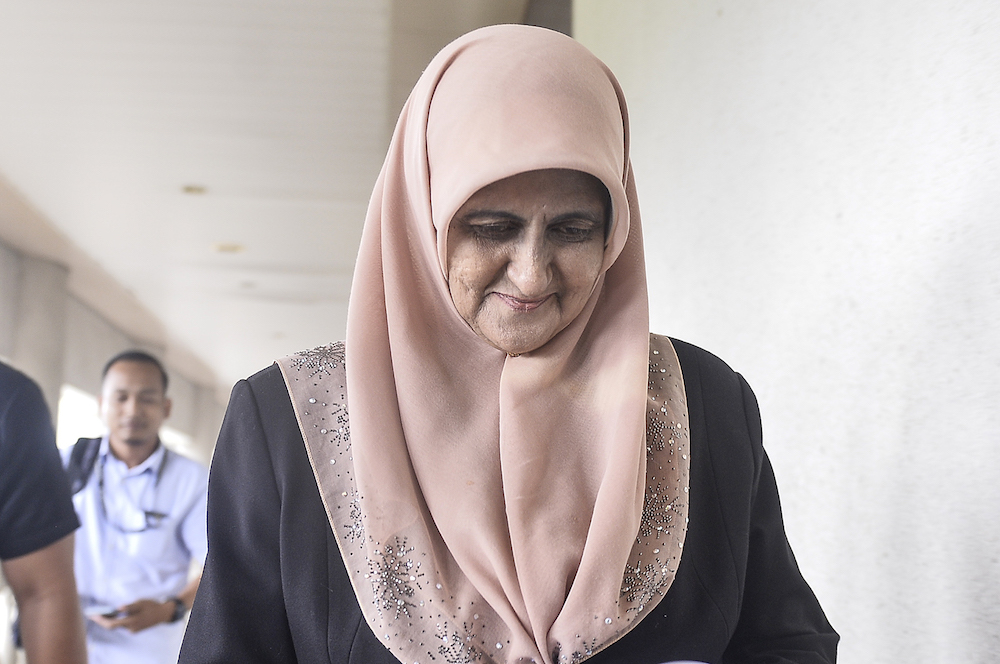KUALA LUMPUR, Jan 14 — A meeting for amendments made to the 2016 federal audit report on 1Malaysia Development Berhad (1MDB) was aimed at protecting then prime minister Datuk Seri Najib Razak as the country’s leader, former federal auditor Saadatul Nafisah Bashir Ahmad told the High Court today.
Testifying against Najib and former 1MDB CEO Arul Kanda Kandasamy in their joint trial for allegedly tampering the 1MDB audit report, Saadatul said the February 24, 2016 meeting that took place at then Chief Secretary to the Government (KSN) Tan Sri Ali Hamsa’s office had emphasised on protecting the image of the nation and its “leadership” then.
In that meeting which was attended by Saadatul and then auditor-general Tan Sri Ambrin Buang, senior government officials including Ali and Arul Kanda were said to have asked 1MDB auditors to remove content from the 1MDB audit report.
During examination-in-chief by lead prosecutor Datuk Seri Gopal Sri Ram, Saadatul who had led the 1MDB audit team, was asked on what she understood the purpose of the meeting to be.
Sri Ram: During the three-hour meeting, what was in your mind, what impression you had gathered for whose benefit were these amendments suggested for?
Saadatul: Well, I think it is more — for the KSN (Tan Sri Ali Hamsa) — so that some of the sensitive issues would not be raised and according to him it may affect the country, the share market...I cannot say whether in my mind of individual benefit but overall for the nation is how the KSN looks from his point of view.
But our point of view is we need to produce as much and represent to the PAC (Public Accounts Committee) as much information as we can.
Sri Ram then went on to ask what Ali had meant with his remark during the February 24, 2016 meeting, referring to Ali’s comment “Because we are meeting here for us it’s basically a national interest...We want to take care of our leadership”.
Sri Ram: What do you understand by leadership, take care of our leadership?
Saadatul: Prime minister.
Saadatul had yesterday said that the 1MDB audit team had already sent the audit report for printing just days before they were scheduled to present the findings to parliamentary watchdog PAC on February 24, 2016, but the presentation was ultimately delayed to March 2016 due to the amendments demanded for in the February 24, 2016 meeting at Ali’s office.
Saadatul said both she and Ambrin had “defended” the special 1MDB audit team’s findings in the audit report during the February 24, 2016 meeting. She had yesterday confirmed that the auditors eventually agreed to remove four items as requested.
Following the February 24, 2016 meeting, four items were removed from the 1MDB audit report, with Saadatul saying that the revised and amended report would never have existed if this meeting did not take place.
Ali had previously told the court that Najib had on February 22, 2016 expressed his dissatisfaction with the audit report and asked him to hold a coordination meeting — which was later held on February 24, 2016 — to resolve dissatisfaction on the report.

Meanwhile, Arul Kanda’s lawyer Datuk N. Sivananthan had informed the court that he will not be cross-examining any of the prosecution witnesses for now, since the prosecution had previously indicated that Arul Kanda may become a prosecution witness.
Sivananthan said that this was to prevent Arul Kanda’s position as a witness from being compromised, but also noted that he will be cross-examining prosecution witnesses if Arul Kanda is subsequently not called as a prosecution witness for any reason.
Explaining this to reporters when met later, Sivananthan said: “The prosecution in its opening speech has stated that they will call Mr Arul as a prosecution witness, they have not changed their stand.
“So what I told the court is, as long as that stand is in place, I want to reserve my rights to cross-examine any of the prosecution witnesses because I don’t want to put Arul in a compromising position by taking any stand on his behalf when he is giving evidence as a prosecution witness.
“However, if at any point in time they decide not to call Arul as a prosecution witness, I will then recall witnesses to be cross-examined. But as it stands in the moment, the prosecution maintains they are calling him as a prosecution witness,” he said.
On the first day of trial, Sri Ram had said that the prosecution will in the future apply to call Arul Kanda who is now the accused to be a prosecution witness via Section 63 of the Malaysian Anti-Corruption Commission (MACC) Act 2009.
Under Section 63 of the MACC Act 2009, in a situation where two or more people are charged with an offence under the law, the court may require one or more of them to give evidence as witnesses for the prosecution if a written application is made by the public prosecutor.
Sivananthan had previously told reporters that Arul Kanda should no longer be an accused person and should have charges against him dropped if he is made a prosecution witness.
In this trial, Najib was charged with abusing his position as prime minister and finance minister to order amendments in February 2016 to the auditor-general’s audit report on 1MDB before its finalisation and presentation to the PAC to avoid any civil or criminal action against him, while Arul Kanda was charged with abetting Najib in the report’s tampering.

















.jpg)



